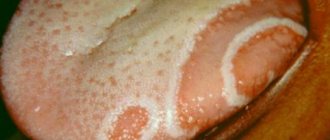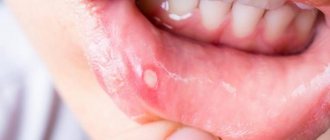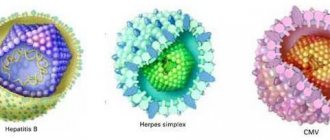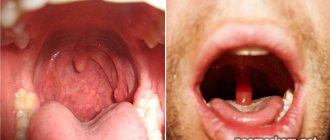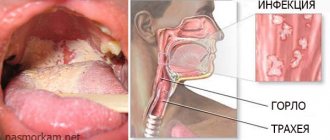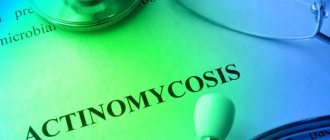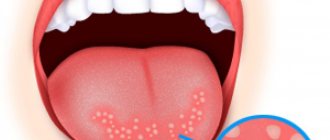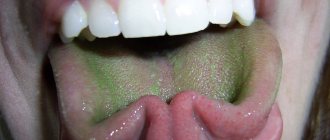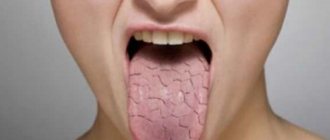Many people feel sourness in their mouth, even if they haven’t eaten anything before. Sometimes this feeling interferes with normal life, especially if heartburn is present. Why does a sour taste occur? What does the human body want to signal with this symptom? How to eliminate sour taste? What measures to take? - we'll figure out.
The appearance of an unreasonable sour sensation in the oral cavity indicates problems with the functioning of the stomach.
Causes
There are many reasons why a sour taste in the mouth and heartburn may occur. Here are some of them:
- the presence of a large amount of gastric juice in the stomach;
- disorders of the stomach and intestines;
- diseases and inflammations of the oral cavity;
- reaction to taking medications;
- pancreatic diseases;
- the presence of reflux esophagitis, a disease when stomach acid enters the esophagus and corrodes its delicate walls;
- pregnancy, in which the enlarging fetus puts pressure on the internal organs and the release of gastric juice into the esophagus is not uncommon;
- Along with dry mouth, a sour taste indicates insufficient fluid intake and some dehydration of the body.
- eating disorders, consumption of low-quality and unhealthy food;
- liver problems, especially if it is not only sour, but also tastes bitter.
As soon as you feel a change, that the taste has become sour, you should contact
If you experience a sour taste in your mouth, you should consult a doctor
doctor. After an examination, the doctor will determine why you feel a sour taste and prescribe treatment. Do not ignore this signal from the body, because if there is sourness in the oral cavity, there may be a disease, and if the disease is diagnosed in time, the cure will take place quickly and without dire consequences.
The sour taste can come in different shades. Sour taste with a sweetish tint:
- a signal from the body that blood sugar is high;
- the result of abuse of sweets;
- the result of nervous tension, being in a stressful state;
- the body's reaction to stress after quitting smoking;
- presence of intestinal or liver disease;
- poisoning by pesticides and other chemicals;
- the body's reaction to taking medications.
How to get rid of heartburn?
Heartburn - causes, symptoms, treatment, dietary table
The basis of treatment for any disease of the gastrointestinal tract is diet. Nutrition for heartburn includes:
- refusal of alcohol, coffee, chocolate, mint, carbonated drinks, fatty, spicy and fried foods, citrus fruits and their juices, tomatoes and products based on them;
- exclusion of foods that are not included in the classic list, but can cause heartburn in a particular patient (to find out, you need to keep a food diary);
- split meals (5-6 times a day) in small portions, under no circumstances overeat to the point of feeling heaviness and fullness in the stomach;
- The last meal and drinks should be no later than 3 hours before bedtime.
For patients suffering from heartburn, it is better to raise the head of the bed by 25-30 centimeters. If you are overweight, you should try to get rid of it, because it is a trigger for heartburn.
If these measures are not enough, you should consult a doctor. Only a specialist can determine the true cause of heartburn and select the right medications in the right dosage.
To eliminate heartburn, its causes and consequences, prokinetics, gastroprotectors, antacids, proton pump inhibitors (PPIs) and H2 blockers are used.
Prokinetics (itomed) improve gastrointestinal motility, thereby improving the process of gastric emptying and normalizing intragastric pressure. These drugs increase the tone of the lower esophageal sphincter, due to which it begins to correctly perform its function - to protect the esophagus from the acidic contents of the stomach. Thus, prokinetics allow you to achieve a long-term effect: they act on the cause, and do not immediately “extinguish” heartburn.
Hydrochloric acid, getting on the delicate mucous membrane of the esophagus, injures it. To restore the mucous membrane, gastroprotectors (for example, rebamipide). They promote rapid healing of damaged areas and strengthen the natural protective layer.
Antacids (Gaviscon, Almagel, phosphalugel, Maalox) can be used if heartburn attacks are relatively rare. These medications are like first aid for heartburn - they eliminate the symptom here and now, but after a while it returns if the source of the problem persists.
Proton pump inhibitors (omeprazole, lansoprazole, pantoprazole, rabeprazole) reduce the acidity of gastric juice. As an alternative, H2 blockers (ranitidine, famotidine, cimetidine, roxatidine) can be used. This is also a temporary relief for heartburn. No drug - no effect.
Separately, let's say about the ancient folk remedy for heartburn - soda. It is better to forget about it once and for all, because carbon dioxide released when neutralizing acid increases pressure in the stomach and stimulates the production of gastric juice. Heartburn disappears for a short time, and then returns with a vengeance.
Constantly sour mouth
The fact that your mouth is sour on a constant basis may indicate the presence of serious diseases:
- gastritis, chronic. It is also characterized by pain in the stomach, the presence of heartburn;
- reflux-esophagitis, development of the inflammatory process of the esophageal mucosa;
- ulcers-wounds of both the stomach and duodenum;
- diaphragmatic hernia, in which the diaphragm does not fulfill its protective function and allows stomach acid to leak into the esophagus;
- diseases of the gums and teeth;
- liver pathologies, cholelithiasis, cholecystitis;
- pancreatitis, diseases of the pancreas.
Sour taste with a bitter tint
The physiological role of bile is the breakdown of fats through bile acids. Under normal conditions, it is prevented from entering the stomach by the pylorus, the outlet valve of the stomach.
Interruptions in the flow of bile are associated with dysfunction of the biliary tract. Excessive flow of bile into the duodenum against the background of its spasm and weakness of the pylorus, especially in the absence of food, leads to the reflux of bile into the stomach, esophagus and further into the oral cavity, causing an unpleasant bitter taste. This phenomenon is called bile reflux.
Actually, bile and acid reflux are rarely found in their pure form. On the way to the esophagus, bile inevitably mixes with gastric juice. This type of mixed reflux has a destructive effect on the mucous membrane of the esophagus, which does not have the same protection as the gastric mucosa.
The duet, consisting of hydrochloric and bile acids, is dangerous not only because it changes the taste and perception of food, but because it slowly but surely destroys the esophagus.
Sour mouth during pregnancy
Sour mouth and the presence of heartburn in pregnant women are not uncommon. There is no pathology here, just the rapidly developing fetus puts pressure on the internal organs and the stomach, as a result, gastric juice spills into the esophagus. also occur, the amount of progesterone (female hormone) increases, which somewhat relaxes organ tissue, as a result, acid is not retained in the stomach.
Relieving the condition of a pregnant woman who complains of a sour taste comes down to following a diet, giving up unhealthy foods and drinking harmful drinks.
What is heartburn? Types of heartburn
Painful sensations behind the sternum in men and women occur as a result of hydrochloric acid entering the esophagus. It may occur sporadically, but frequent and severe heartburn may indicate the presence of stomach and other diseases.
Causes and symptoms
Main reasons:
- Gastroesophageal reflux disease (represents regurgitation of gastric contents into the esophagus). Esophageal dysfunction occurs due to weakening of the sphincter muscles.
- Diseases of the gastrointestinal tract. Particularly often, unpleasant sensations are observed in people with a hiatal hernia, peptic ulcer of the stomach or duodenum (diseases are accompanied by a burning sensation, nausea and pain, especially on an empty stomach or before meals.)
- Stomach disorders. Heartburn is accompanied by pain in the abdomen around the navel, burning in the throat, flatulence and belching. The unpleasant condition occurs mainly after overeating or eating heavy food.
- Another reason may be overeating, because... Excess food in the stomach provokes abdominal pressure and promotes gastrointestinal reflux.
- Painful sensations can also occur after gastrectomy, with diseases of the bile ducts, and during pregnancy. Some medications can slow down the lower esophageal sphincter.
the main cause of heartburn is gastrointestinal reflux, accompanied by unpleasant sensations in the esophagus
Provoking factors and symptoms
Other causes of heartburn in adults:
- damage to the mechanism that prevents the outflow of gastric contents;
- esophageal motility disorder;
- increased production of stomach acid;
- increased abdominal pressure due to excess weight or pregnancy;
- irritation or inflammatory processes in the esophagus (especially common after drinking alcohol);
- consumption of foods and drinks that increase symptoms (coffee, tea, carbonated drinks, chocolate, citrus fruits and juices, tomatoes, hot spices, fatty foods, mint, yeast dough).
- hiatal hernia;
- stomach disorders;
- deficiency of salivation;
- scleroderma (connective tissue disease);
- gastric hyperplasia;
- psychoneurotic disorders;
- taking medications containing acetylsalicylic acid, antibiotics, especially when taken on an empty stomach.
The following factors can increase discomfort:
- nervous tension;
- alcohol abuse;
- smoking;
- psychological exhaustion and fatigue.
Heartburn can be caused by bending over, eating a heavy meal, having a late dinner and other factors. Milk and other drinks may provide temporary relief.
How does heartburn manifest?
- burning sensation in the esophagus;
- belching;
- burning pain in the chest area.
Frequent heartburn can lead to undesirable negative consequences
Consequences of heartburn. Possible complications
Long-term exposure to stomach acid on the esophagus can lead to inflammatory processes, and in severe forms, to erosions and peptic ulcers, which can lead to bleeding. With complications, cicatricial strictures may occur, making normal eating difficult.
Treatment
If a sour taste in the mouth is the only symptom, proper nutrition will help cope with the problem.
Do not self-medicate if you feel an unusual taste in the mouth, especially if heartburn, belching and pain in the epigastric region and lower back appear - consult a doctor immediately. If sourness in the mouth is infrequent and is not accompanied by other unpleasant symptoms, for example, no heartburn or belching, you can use these tips:
- don't overeat;
- do not eat unhealthy foods (spicy, fried, fatty);
- practice split meals (4-5 times a day);
- Avoid drinking harmful drinks, drink water with lemon, green tea, fresh juices. Avoid strong tea, sweet, highly carbonated drinks, various energy drinks, and coffee;
- do not smoke;
- Take care of your oral health; in addition to your toothbrush, also use dental floss and mouthwash. Visit the dentist once every six months;
- do not drink alcohol, even beer;
- After eating, stay upright for an hour;
- We do not recommend “quenching” the feeling of heartburn with soda; acid extinguished with soda causes the opposite effect, which lies in the excessive release of a substance that causes flatulence, belching, and bloating.
If you notice that the situation is not improving and you are experiencing acid in your mouth and heartburn more often, it is better to consult your doctor. A therapist, gastroenterologist or dentist will help you.
Preventing heartburn
To prevent heartburn from bothering you, follow some rules.
Change your lifestyle:
- do not bend over after eating;
- do not lie down immediately after eating (you need to wait 1.5-2 hours);
- sleep on two pillows;
- do not wear tight clothes, tight belts, bandages or corsets;
- do not lift heavy things;
- give up cigarettes;
- think about losing weight if you are overweight.
Change your diet:
- don't overeat;
- do not eat very hot or too cold food;
- do not overeat at night (dinner should be 3 hours before bedtime);
- try not to eat fatty, fried, pickled, spicy foods, as well as citrus fruits, onions, garlic, sour fruits and chocolate;
- try not to drink alcohol, coffee, strong tea, sour juices and fruit drinks.
Why does heartburn occur?
It is possible to answer the question why constant heartburn bothers a person only after a more thorough determination of his health problems. Typically, constant belching and heartburn is the main symptom of gastroesophageal reflux disease . This is a very common disease, which is a consequence of damage to the esophageal mucosa by stomach acid. If a person is healthy, then an alkaline environment prevails in the esophagus, which allows one to protect against acid from the stomach. This is achieved with the help of the esophageal sphincter , that is, the muscle that compresses the junction of the esophagus and the stomach. If the sphincter is underdeveloped, the contents of the stomach are thrown back, and the person constantly suffers from heartburn. By the way, the sphincter is underdeveloped in infants. That is why parents often have to think about what to do to prevent their child from spitting up. The esophagus is also protected by a diaphragm , which covers the junction of the esophagus and the stomach and helps retain acid inside the stomach.
Why does heartburn occur in healthy people? As in patients with gastrointestinal disorders, this symptom appears due to the reflux of stomach contents into the esophagus. However, if heartburn occurs periodically, it is not yet a sign of gastroesophageal reflux disease . But if this happens often, then erosions may appear in the esophagus, which subsequently, without proper treatment, develop into esophageal ulcer .
Thus, when answering the question of why heartburn occurs, a number of factors should be taken into account. When determining the causes of this symptom, it is necessary to determine from which foods the feeling of heartburn develops, at what acidity in a person this occurs, in which diseases this symptom is present. Why heartburn appears almost every day, and what kind of heartburn there is in terms of the characteristics of its manifestation, the patient can find out at an appointment with a doctor.
Heartburn develops in humans due to incompetence of the esophageal sphincter. He can relax due to stress and when taking a number of medications. This symptom can also be provoked by a hiatal hernia . In this condition, part of the stomach protrudes through an opening in the diaphragm. As a result, gastric juice is thrown into the esophagus. If the motor functions of the stomach are impaired, the periodic appearance of heartburn may be one of the signs of the disease.
The causes of heartburn at night, after eating or exercising, sometimes consist in the development of chronic gastritis with increased secretion of gastric juice. In this case, the direct cause of heartburn after eating is eating too fatty foods, as well as fried, spicy, smoked foods. After eating, in this case, not only belching and heartburn appear, but also pain in the upper abdomen.
Often the causes of constant heartburn are determined by the development of gastric and duodenal ulcers . In this case, the appearance of an ulcer on the gastric mucosa leads to impaired contraction of the stomach, an increase in pressure in it and, as a result, active reflux of stomach contents into the esophagus. In this regard, severe symptoms of heartburn of the stomach and esophagus appear.
With achylia and achlorhydria, there is no pepsin and hydrochloric acid . Consequently, the causes of heartburn are the reflux of lactic and butyric acid into the esophagus, which appears as a result of fermentation of its contents in the stomach.
If a person has had part of the duodenum and stomach surgically removed, then bile and digestive juice enter the esophagus, which leads to heartburn.
In people who do not suffer from chronic gastrointestinal diseases, heartburn is very often the result of poor nutrition and overeating. Most often, the feeling of heartburn occurs after eating sweets, fresh baked goods, brown bread, alcohol, coffee, sour fruits, etc. It should also be noted that proper nutrition for heartburn and gastritis can significantly improve a person’s well-being and relieve him of the often manifested heartburn. What diet is most optimal for heartburn and gastritis will be individually advised by your attending physician.
You should always remember that a burning sensation in the chest area may not always be a consequence of heartburn. In some cases, this symptom is evidence of the development of diseases of the cardiovascular system in the body - angina pectoris , arterial hypertension .
When lifting heavy objects, heartburn can suddenly manifest itself even in a healthy person. The fact is that in this case, intra-abdominal pressure , and gastric contents enter the esophagus in large quantities.
Heartburn in women often first appears during pregnancy. Why heartburn occurs in pregnant women is explained, first of all, by the big changes that are actively occurring in the body of the expectant mother. More often, the question of what pregnant women can do for heartburn becomes relevant for expectant mothers in the last months of bearing a baby . Sometimes the burning attacks are so intense that a woman’s sleep is even disturbed. Such severe heartburn in pregnant women is, first of all, the result of changes in hormonal levels in a woman’s body. An increase in the production of the hormone progesterone in the body leads to relaxation of smooth muscles and, as a result, the sphincter muscles.
Why heartburn in pregnant women can be so severe is also explained by the fact that the actively enlarging uterus puts a lot of pressure on the organs of the digestive system. Despite the fact that attacks of heartburn can significantly affect the quality of life of a pregnant woman, you should never decide on your own what to do and how to get rid of heartburn. What to take to alleviate the condition, and what helps to immediately reduce the burning sensation, is determined only by the attending physician. After all, the medicine must be safe for both the health of the woman and the baby. In the last weeks of pregnancy, heartburn attacks become less intense as progesterone production decreases. But if a woman takes a competent approach to the formation of her daily diet, carefully choosing what to drink and eat during pregnancy, then the manifestations of heartburn can be significantly reduced.
